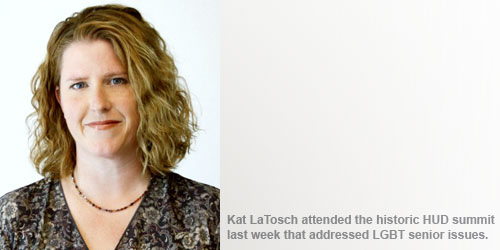
For the first time in history the U.S. Department of Housing and Urban Development has come forward publically with concern for the housing needs of aging LGBT adults. Among those in attendance at their Dec. 7 LGBT Elder Housing Summit was Kat LaTosch, who is part of the Detroit area's LGBT Older Adult Coalition.
The summit addressed the issues facing older LGBT adults, and brought together leaders from around the country who are working to address those concerns. LaTosch traveled at her own expense to the conference, held at the HUD headquarters in Washington DC. Speakers included John Trasvina of HUD's Office of Fair Housing and Equal Opportunity, Raphael Bostic of HUD's Policy and Research Development, Hope Barrett from the Center on Halsted in Chicago, Lore Cook-Daniels of the Transgender Aging Network, Sheila Moore of Triangle Square in Los Angeles, and Jay Silver of Rainbow Vision in Santa Fe, New Mexico.
"In California there is Triangle Square, which is a beautiful facility with about 100 apartments for low income older LGBT adults, and they are in the process of developing a new community, but are still in the planning stages," LaTosch said. "In Chicago the Center on Halstead has a home sharing project that connects young people who need a place to stay with older adults who need live-in care. This gives young people low rent and gives the elder the care they need.
"There are a lot of people doing interesting things to address this issue, and we can learn from how they do it," says LaTosch.
The LGBT Older Adult Coalition is working to unite seniors in the community to address many needs, including housing and care. Their plans were outlined in a previous BTL article, including the intent to form a local SAGE chapter and to present at care provider conferences to educate caregivers about the needs of the community.
"In Michigan there are over 70,000 LGBT adults who are 65 and older. Based on the census, we can conservatively estimate that there are 22,000 in the tri-county area. Add to that an additionally 22,000 in the 55-65 year old range, and there are a lot of people who need services or will be needing them," LaTosch says. "We've had over 100 people participate in the summits we have held already, and over 100 attended the GenSilent film last week. That is a lot, but there are a lot more people that we need to reach, and more people out there who should be getting involved."
Senior LGBT individuals are more likely to live alone, less likely to have children to take care of them, less likely to have supportive families of origin, and more likely to fear institutions that might be able to help them with care. They also face legal battles in estate rights and paying more taxes because they are not afforded the same rights couples get when they are married. On top of it, over half of the people infected with HIV are age 50 or older.
LaTosch has been working on the Coalition for the past year and a half, contacting care providers and organizing seniors to help determine their needs. "I've always had a soft spot in my heart for older adults. I had a particular grandparent that I would go and visit. I know several seniors who are in horrible living situations. I know several who are oblivious to old age coming. People tend to ignore old age. They want to live at home and be independent as long as they can instead of facing it and making plans."
She noted that one couple she's talked to is so much in the closet that they refuse to use the word "lesbian."
"They're in their 70s and they live together but they won't even go to get a will done because they are so afraid," LaTosch said. "How many people out there are like that? These are people that grew up in a time that homosexuality was considered a mental illness. People who were homosexuals could be committed or even arrested. It's hard for people from that era to open up about who they are."
The HUD summit allowed LaTosch to appreciate what's being done in other communities, and to feel good about the direction of public policy. "This was very official," she said. "It clearly spoke to the institutional and governmental support to address this need. It was a very public statement that they are working on policy issues for LGBT older adults."
In order for the LGBT Older Adult Coalition to move forward, the group needs to identify more than just seniors in need. "One thing we need is people to start serving on boards and committees. We need people in care facilities and agencies at all levels who work with seniors to get involved. We need nursing homes and home care agencies that are willing to come out as LGBT affirming. And we need elders to come forward and speak about this."










